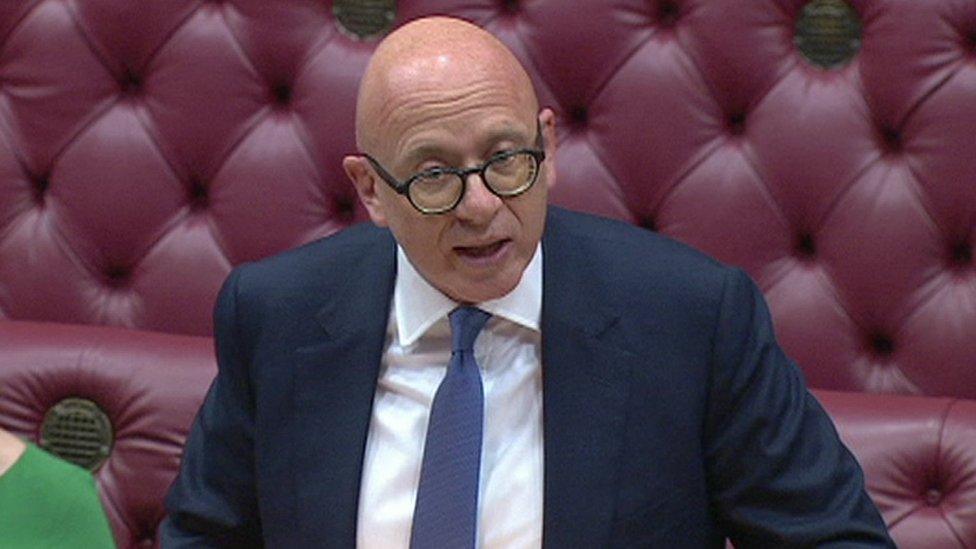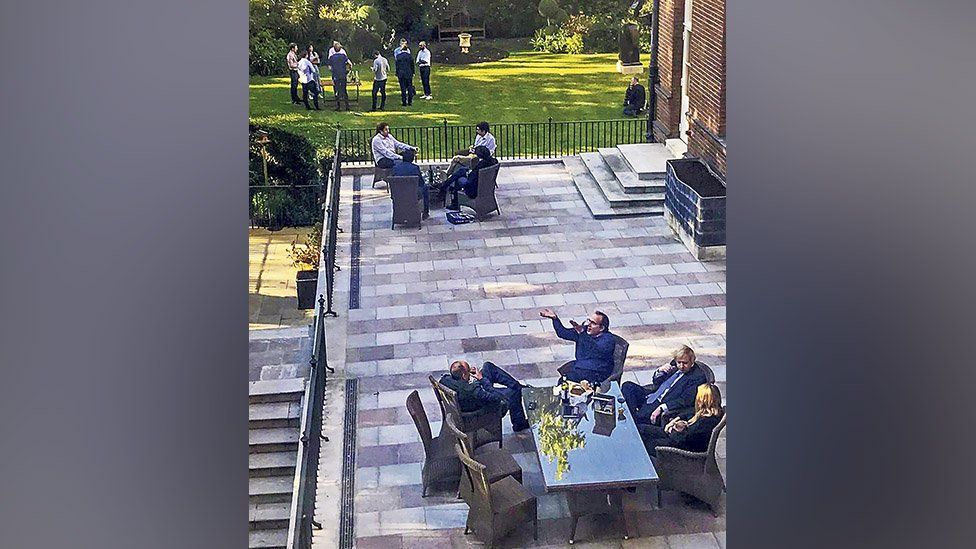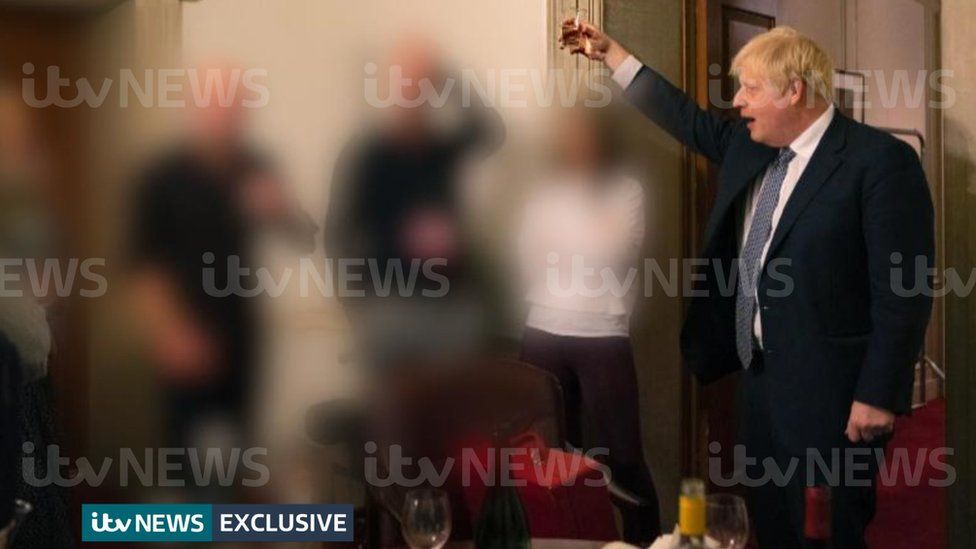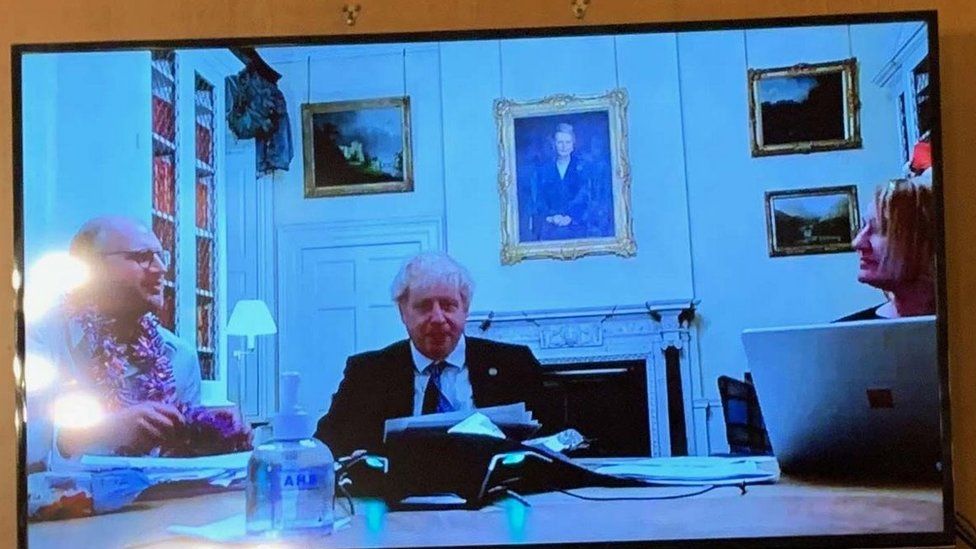Minister Lord David Wolfson quits over Covid law-breaking at No 10
- Published
- comments

A Conservative peer has resigned as a justice minister over Covid law-breaking in Downing Street.
It comes after Prime Minister Boris Johnson and Chancellor Rishi Sunak were fined for attending a party in No 10 during lockdown.
In a letter to Mr Johnson, Lord David Wolfson criticised the "official response" to "repeated rule-breaking".
He is the first person to quit the government since reports of lockdown parties emerged.
Opposition parties are calling for the PM and chancellor to resign over their fines - but they have been backed by their fellow cabinet ministers.
Some Tory MPs who previously called for the PM to resign have expressed their support. Since the fines were issued on Tuesday, only three Tory MPs have publicly said he should quit.
The latest to do so, Tobias Ellwood, was among those who said they would submit no confidence letters in his leadership earlier in the year.
On Thursday, he told BBC Radio 4 it had been his "consistent" view Mr Johnson should "step back" to help his party's chances at the next general election.
Barrister Lord Wolfson has been a justice minister since December 2020, with responsibility for human rights and the constitution.
In his resignation letter, external, he said the "scale, context and nature" of Covid breaches in government was inconsistent with the rule of law.
He added that he had "no option" other than to resign, given his "ministerial and professional obligations" in this area.
"It is not just a question of what happened in Downing Street, or your own conduct," he wrote to the PM. "It is also, and perhaps more so, the official response to what took place."
Mr Johnson's fine - for attending a surprise birthday gathering held for him in Downing Street in June 2020 - means he is the UK's first serving prime minister to be sanctioned for an offence under criminal law.
He is known to have attended at least two further events being investigated by police, meaning he could be fined again.
One No 10 aide who witnessed many of the events being investigated told the BBC the fine Mr Johnson has already received was for the least serious gathering he attended.

Resignation reflects concerns

There hasn't been much public criticism of Boris Johnson from his own side since the police fined him for breaking Covid rules.
But the resignation of Lord Wolfson reflects private concerns that some have.
Two ministers have told me they do want the prime minister to resign, but they know there's no appetite among Conservative MPs at the moment to move against him.
More fines could change that dynamic.

In a tweet, Labour's shadow justice secretary Steve Reed praised Lord Wolfson "for taking a principled stand".
He asked what this meant for Justice Secretary Dominic Raab, "who's constitutionally charged with upholding the law but is instead condoning law-breaking".
Mr Raab is among the cabinet ministers to have publicly backed Mr Johnson and Mr Sunak.
Liberal Democrat justice spokesperson Wera Hobhouse said Lord Wolfson's resignation showed that voters had "had enough of Boris Johnson acting as though he is above the law".
"Boris Johnson and Rishi Sunak should both go, so we can focus on what really matters - giving families the support they need to weather the cost of living crisis," she said.
Johnson: I fell short in observing the rules
The prime minister can only be removed by a vote of no confidence in Parliament, or by his own MPs organising a leadership contest, neither of which is likely to happen at this stage.
As a member of the House of Lords, Lord Wolfson will not be able to submit a letter of no confidence in the PM to trigger a Tory leadership contest.
Reports of parties being held in Downing Street during lockdowns first emerged in December last year, with Mr Johnson initially insisting that "guidelines were followed at all times".
Mr Sunak also told the Commons: "I did not attend any parties."
The PM then ordered an inquiry into the allegations of rule-breaking, led by senior civil servant Sue Gray.
The Met initially said it would not retrospectively investigate the allegations unless "significant evidence" of a regulation breach came forward.
But after Ms Gray passed information to officers, they launched their own inquiry.
Her full report will not be released until the Met has concluded its investigation.



